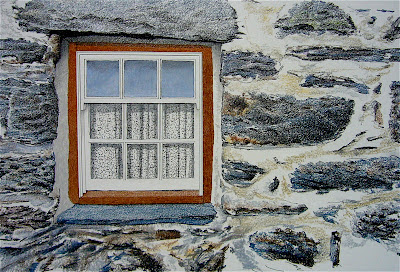Cae'r Gors, Rhosgadfan
 |
Cae'r Gors, Rhosgadfan (Pastel and Ink on board)
|
Cae’r Gors, the childhood home of Kate Roberts.
Kate Roberts (13 February 1891 – 4 April 1985) was one of the foremost Welsh-language authors of the twentieth century. Known as Brenhines ein llên ("The queen of our literature"), she is known mainly for her short stories, but she also wrote novels. Roberts was also a prominent Welsh nationalist. Roberts was born in the village of Rhosgadfan, Caernarfonshire (Gwynedd today) where her father (Owen Roberts) was a quarryman in the local slate quarries. She graduated in Welsh at the University College of North Wales, Bangor and then trained as a teacher. She then taught in various schools in south Wales.
An early member of Plaid Cymru, the Welsh nationalist party, it was at their meetings that she met Morris T. Williams, whom she married in 1928. Williams was a printer, and eventually they bought the printing and publishing house Gwasg Gee (The Gee Press), Denbigh, and moved to live in the town in 1935. The press published books, pamphlets and the Welsh-language weekly Y Faner (The Banner), for which Roberts wrote regularly. After her husband's death in 1946 she carried on working the press for another ten years.
She remained in Denbigh after her retirement and died in 1985.
It was the death of her brother in the First World War that led Roberts to writing. She used her literary work as a means of coming to terms with her loss.
Her first volume of short stories appeared in 1925 O gors y bryniau ("From the swamp of the hills") but perhaps her most successful book of short stories is Te yn y grug ("Tea in the heather") (1959), a series of stories about children. As well as short stories Roberts also wrote novels, perhaps her most famous being Traed mewn cyffion ("Feet in chains") (1936) which reflected the hard life of a slate quarrying family. In 1960 she published Y lôn wen, a volume of autobiography.
Most of her novels and short stories have as a background about the region where she lived in north Wales. She herself said that she derived the material for her work, "from the society in which I was brought up, a poor society in an age poverty ... it was always a struggle against poverty. But notice that the characters haven't reached the bottom of that poverty, they are struggling against it, afraid of it." Her work deals with the uneventful lives of humble people and how they deal with difficulties and disillusionments.
A selection of Roberts's works in Welsh and in translation- Traed mewn cyffion (Feet in chains) (1936). Novel. Llandysul : Gwasg Gomer, 2001.
- Ffair Gaeaf a storïau eraill (Winter fair and other stories) (1937). Short stories. Denbigh : Gwasg Gee, 2000.
- Y byw sy'n cysgu (The living that sleep) (1956). Novel. Denbigh : Gwasg Gee, 1995.
- Te yn y grug (Tea in the heather) (1959). Short stories. Llandysul : Gwasg Gee, 2004.
- Y lôn wen (The white lane) (1960). Autobiography. Denbigh : Gwasg Gee, 2000.
- Ifans, Dafydd (Ed.) (1992), Annwyl Kate, annwyl Saunders : gohebiaeth, 1923–1983 (Dear Kate, dear Saunders : correspondence, 1923–1983). Aberystwyth : National Library of Wales. The letters of Kate Roberts and Saunders Lewis.
- Roberts, Kate (2002), Feet in chains. Translated by John Idris Jones. Bridgend : Seren.
- Roberts, Kate (2001), Sun and storm and other stories. Denbigh : Gwasg Gee.
- Roberts, Kate (2002), Tea in the heather. Translated by Wyn Griffith. Bridgend : Seren.
- Roberts, Kate (1991), The world of Kate Roberts : selected stories, 1925–1981. Translated by Joseph P. Clancy. Philadelphia : Temple University Press. A general introduction to her short stories in English which includes a translation of Te yn y grug (Tea in the heather).
Read this article in full at http://en.wikipedia.org/wiki/Kate_Roberts_(author)


Comments
Post a Comment